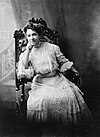The Voice of the Negro
The Voice of the Negro (German: The voice of the Negro ) was an American literary magazine , the cultural achievements and political concerns of the African American published population. The magazine was founded by John WE Bowen and Jesse Max Barber and existed from January 1904 to 1907.
The magazine was originally based in Atlanta , Georgia . After the Atlanta Race Riots in September 1906 and disagreements with the Atlanta city government, the headquarters had to be relocated to Chicago , Illinois .
Contents, characteristics
According to Louis R. Harlan, The Voice of the Negro differed considerably from the other Afro-American publications founded at the beginning of the 20th century, as the title of the magazine promised to represent a voice or at least a forum for all Black America.
In fact, the magazine provided a framework for publication for the entire spectrum of black ideologies and aspirations for liberation - from the Back to Africa movement on the one hand to the integrationalists on the other, with all shades of conservative to militant positions in between. The newspaper summarized all race-related events in a monthly news bar and featured dedicated editorials. It dealt with a wide range of topics, be it a linguistic and ideological debate on the term Negro , be it disfranchisement or racial relations in other countries. Two of the authors, Washington and Du Bois, were staunch opponents when it came to the political orientation of the Afro-American population - pragmatically the older, more combative the younger.
Authors
The magazine published the writings of Booker T. Washington (1856–1915), an influential leader of the African American community, and a number of younger intellectuals and activists, including:
- the sociologist and civil rights activist William Edward Burghardt Du Bois (1868–1963),
- the educators John Hope (1868–1936) and Mary Church Terrell (1863–1954)
- the mathematician and sociologist Kelly Miller (1863–1939),
- the journalist and author William Pickens (1881–1954).
The magazine also published poetry - including by James D. Corrothers (1869-1917), Georgia Douglas Johnson (1877-1966) and Paul Laurence Dunbar (1872-1906).
Publications with the same name
Robert Thomas Kerlin (1866-1950) published a book in 1920 with the title The Voice of the Negro , which is unrelated to the magazine. The book summarizes African American press reviews after the riots and lynch acts of 1919.
In February 1927 a new magazine appeared with the title The Voice of the Negro , this time edited by the political activist and publicist Hubert H. Harrison and the International Colored Unity League he founded . Above the front page was The Embryo of , including A Magazine Struggling to Be Born . However, since the editor died unexpectedly in December of the same year, the publication could not be continued.
In the 1960s, Chicago radio station WVON was called The Voice of the Negro . The radio station was the first to report the assassination of Martin Luther King and is now called The Voice of the Nation . A number of prominent journalists and musicians worked or work for the station, including Don Cornelius , Randy Daniels , Roland Martin and Earl Washington .
See also
literature
- William L. Andrews, Frances Smith Foster and Trudier Harris (Eds.): The Concise Oxford Companion to African American Literature . Oxford University Press 2001, ISBN 9780195138832
Web links
- The Voice of the Negro , filmed copies of the originals at Harvard University
Individual evidence
- ^ Daniel J. Royer: Voice of the Negro The Oxford Reference, accessed July 3, 2016.
- ↑ The then newly established magazines included Alexander's , Colored American Magazin , Horizon , Howard's and Moon . Brief descriptions of some of these titles can be found in Remmel Nunn: Key Titles in African American Periodicals, 1825-1995: Part One of Three , Reader Blog, October 25, 2011, accessed July 3, 2016.
- ^ A b Louis R. Harlan: "Booker T. Washington and the Voice of the Negro, 1904-1907", Journal of Southern History 45 (February 1979), pp. 45-62. Available online at: [1] , accessed July 3, 2016.
- ↑ Kerlin's book is available online, see: [2] , accessed on July 3, 2016. Also the English Wikipedia article Red Summer (1919) .
- ^ The Voice of The Negro , facsimile of v. 1, n. 1, provided by Columbia University, accessed July 3, 2016.
- ^ Columbia University Libraries , Archival Collections: Hubert H. Harrison papers, 1893-1927. , accessed July 3, 2016.
- ↑ Howard Reich: 50 years of Chicago's WVON: A Chicago voice that echoes nationwide , Chicago Tribune, March 29, 2013, accessed July 3, 2016.




